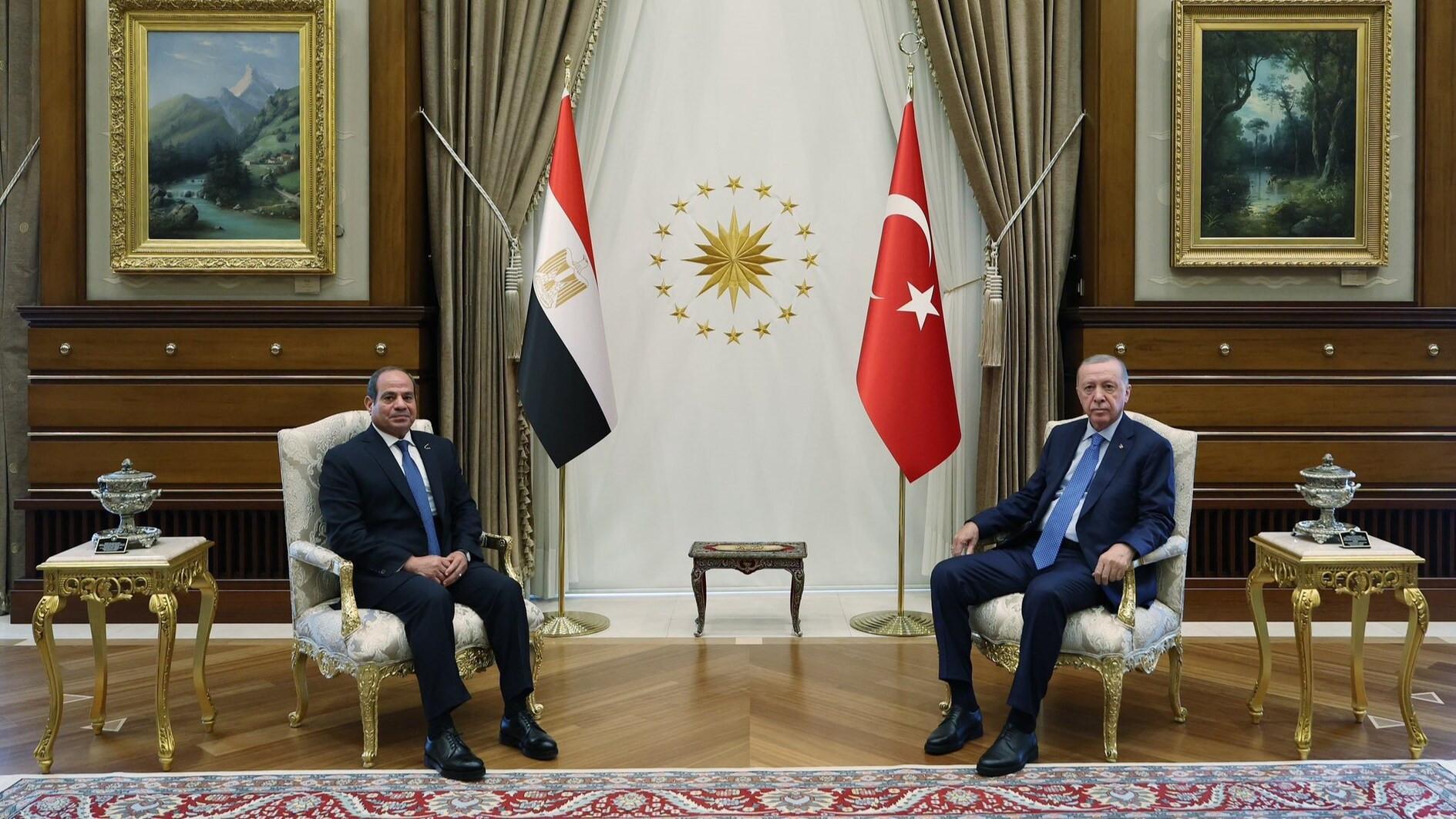
Türkiye and Egypt are improving bilateral relations, President Recep Tayyip Erdoğan said during his counterpart Abdel Fattah al-Sisi's landmark visit to Ankara on Sept. 4.
“We are continuously strengthening our deep-rooted relations between our countries,” Erdoğan said during a joint press conference in the Turkish capital.
Al-Sisi was greeted personally by Erdoğan at Esenboğa Airport. The two leaders traveled together to the presidential complex for a formal welcoming ceremony, followed by a private meeting.
The ongoing war in Gaza was expected to dominate the discussions as the talks will focus on joint efforts to halt Israeli military actions in Gaza and establish a ceasefire.
Additionally, the leaders were set to address other regional issues.
Erdoğan underscored the "shared stance" of Türkiye and Egypt on the Palestinian issue.
“The cessation of attacks and a permanent ceasefire continue to be our priority... We have done and are doing everything we can to increase pressure on the Israeli government," he said.
Erdoğan also criticized countries he said are complicit in Israeli actions by supporting Prime Minister Benjamin Netanyahu’s government.
In response, al-Sisi thanked Erdoğan and Turkish officials for their hospitality and expressed hope for progress in the bilateral ties.
The visit, described by local and global media as a "turning point," comes after years of strained relations and is seen as a signal of a potential new era of cooperation between Türkiye and Egypt.
Al-Sisi's visit follows Erdoğan's trip to Cairo in February, the first of its kind since 2012 where the two nations elevated their relationship to the level of “strategic cooperation."
Both leaders described the visit as the beginning of a “new term” in bilateral ties, which had been strained since the ouster of Egypt's Mohammed Morsi-led government in 2013.
A high-level strategic cooperation council meeting was also held during al-Sisi's visit, where the two leaders oversaw the signing of 17 agreements across various sectors, including education, infrastructure, aviation, transportation, health, energy and environment.
Economic relations were to be a significant part of the agenda, with discussions aimed at increasing mutual investments and trade.
The target is to boost trade volume between the nations from the current $10 billion to $15 billion.
Al-Sisi was accompanied by representatives from Egypt's business community as energy cooperation, particularly in liquefied natural gas (LNG), renewable energy and mining, was on the table.
The thaw in relations between Türkiye and Egypt began in early 2021 as part of a broader Turkish diplomatic initiative, culminating in a handshake between al-Sisi and Erdoğan during the 2022 World Cup inauguration in Qatar.
Last year's devastating earthquakes in southern Türkiye further cemented the thaw as Egypt provided humanitarian aid and dispatched its then Foreign Minister Sameh Shoukry to the disaster-stricken areas.
In July 2023, the two countries exchanged ambassadors, accelerating their rapprochement amid the ongoing war in Gaza, where both Cairo and Ankara have found common ground in their disagreements with Israel.
Last month, Turkish Foreign Minister Hakan Fidan visited Cairo and met with al-Sisi and his Egyptian counterpart, Badr Abdelatty.
The two sides discussed the steps to be taken to ensure al-Sisi's visit is “as productive as possible," Abdelatty said at a joint press conference with Fidan on Aug. 5.
Fidan’s visit included stops at key sites like El Arish airport, the Rafah border crossing and the Egyptian Red Crescent's logistics center, where humanitarian aid to Gaza was a central topic.
Meanwhile, Türkiye issued a response to recent allegations by Israeli Prime Minister Benjamin Netanyahu, who accused Cairo of maintaining the Israeli military presence in the Philadelphi Corridor, a demilitarized zone along Gaza's border with Egypt.
Netanyahu claimed that the corridor, which runs from the Mediterranean to the Kerem Shalom crossing with Israel, has become a "lifeline" for Hamas to rearm through weapons smuggling.
“Israeli Prime Minister Netanyahu continues his lies to manipulate public opinion in order to cover up his crimes in Gaza and prevent the ceasefire talks from reaching a conclusion," read a statement issued by Türkiye’s Foreign Ministry on Sept. 4.
It also expressed Türkiye’s support for Egypt’s mediation efforts to end the ongoing conflict in Gaza.